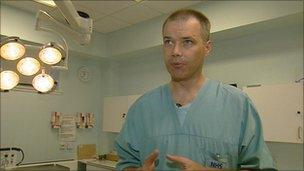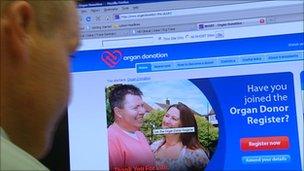Horse Whisperer author's wife urges end to organ waste
- Published
Charlotte Gordon Cumming and her family were left with kidney failure after accidentally eating poisonous mushrooms
The wife of the author of The Horse Whisperer has called on the NHS to stop "wasting" organs which could be used for transplant.
Nicholas Evans, his wife, and two other family members suffered kidney failure after accidentally eating poisonous mushrooms three years ago.
Mr Evans's wife, Charlotte Gordon-Cumming, said there was a "shocking" waste of organs from deceased donors.
She said currently only organs from deaths in intensive care were used.
Mr Evans, whose book became a Hollywood hit starring Robert Redford in 1998, ate mushrooms picked in woodland in Moray while on holiday in September 2008.
His wife Charlotte, her brother Sir Alastair Gordon-Cumming, and his wife, Louisa, also suffered severe kidney failure after the incident.
Intensive care
Mr Evans recently had a kidney transplant but his wife, who has been on dialysis for three years, is hoping to receive an organ from a family friend.
She said she wanted to use her family's notoriety to campaign to increase the number of organs available for donation.

Consultant Brodie Paterson said the biggest obstacle he faced was consent
Ms Gordon-Cumming, from Totnes in Devon, said: "The myth that the media give is that we have not enough donors and that is incorrect.
"We do have donors but at the moment the only organs being used are the organs from intensive care.
"So where you die makes a hell of a difference."
Ms Gordon-Cumming claimed 100 organs a week from other potential donors were being "wasted".
A review of transplantation in the UK in 2008 recognised that departments outside intensive care were not considering organ donation enough.
It recommended a change in culture in the NHS so that donation became normal practice.
Brain-dead donors
But transplant experts denied that so many organs were being overlooked.
Brodie Paterson, a consultant in accident and emergency at Ninewells Hospital in Dundee, said: "If a set of kidneys have not been supplied with blood for a period, those kidneys will start to die.
"This is why brain-dead donors donate organs in a very good condition.

Scotland has the highest rate of people signing up to be organ donors in the UK
"They undergo the operation to donate with their heart still beating so the organs are being perfused with oxygen and blood and are in the best possible condition."
He said they were trying to allow other patients whose heart had stopped beating to become donors but there were problems.
Mr Paterson said: "Donation after cardiac death does give us someone whose organs have not been exposed to illness, but that person needs to die relatively quickly to allow their organs to be donated. We have up to two hours."
The Kidney Federation has campaigned for more effort to be made to take organs from donors other than brain stem dead patients, and change is not happening fast enough for Ms Gordon-Cumming.
She said: "Because the hospitals are not taking the organs, we're all put on dialysis and told to wait.
"I think it's a tragedy that people who take this huge decision then might find that their organs are wasted."
Relatives' consent
Scotland has the highest rate of people signing up to be organ donors in the UK but if you live in Scotland you are less likely to have that wish carried out.
The rate of organ donations from deceased Scots, other than brain dead donors, is half of that in England, and only a third of the rate in Wales.
But Mr Paterson pointed out that the biggest obstacle he faced was still obtaining the consent of relatives.
He said: "The number one way to increase the number of donors would be for more people to sign up to the register and almost as importantly, telling someone they've done it."
Both Ms Gordon-Cumming and her brother Alastair are now due to receive kidneys from family friends who have found to be a good tissue match.
Both donor and recipient can function with one kidney each.
Meanwhile transplant authorities said they were on track to meet a target to increase the number of transplants by 50% by 2013.
- Published12 September 2011